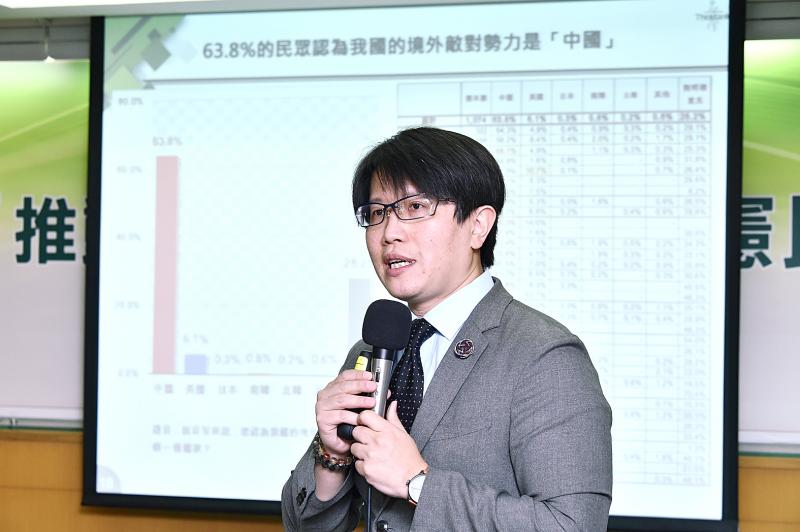Only 2 percent of respondents to a poll on constitutional amendments and national identity identified as Chinese, while 62.6 percent identified as Taiwanese, the Taiwan Thinktank said yesterday.
Legislators have proposed amendments to the Additional Articles of the Constitution (憲法增修條文), which would change the definition of the nation’s territory, remove the Taiwan Provincial Government as an entity, prioritize the use of “Taiwan” for national groups at international events, and remove restrictions on defining the national emblem, national flag and national anthem.
The poll showed that 80.5 percent of respondents agreed that the nation should participate as “Taiwan” at events organized by world bodies, while 12 percent disagreed.

Photo: Tu Chien-jung, Taipei Times
Ethnically, 62.6 percent identified as Taiwanese, while 2 percent identified as Chinese and 32.6 percent identified as both, the results showed.
If they were forced to choose between Taiwanese and Chinese, 86 percent chose Taiwanese and 6.3 percent selected Chinese, while 1.1 percent adamantly maintained that they are both.
When asked what name the nation should use at global events, 51.2 percent of respondents said “Taiwan,” while 33 percent said the “Republic of China,” 9.7 percent said “Chinese Taipei” (中華台北), 0.6 percent said “Zhongguo Taibei” (中國台北), and 2 percent said “Separate Customs Territory of Taiwan, Penghu, Kinmen, and Matsu,” while 0.1 percent said other names, 2.9 percent said they did not know or had no opinion, and 0.5 percent refused to answer.
Under a 1981 agreement with the International Olympic Committee, the Republic of China Olympic Committee was renamed the Chinese Taipei Olympic Committee.
In 2008, China used “Zhongguo Taibei” instead of “Chinese Taipei,” saying that there was no difference between them in Chinese.
To join the WTO in 2002, Taiwan used the name “Separate Customs Territory of Taiwan, Penghu, Kinmen and Matsu.”
The poll results show a consolidation of Taiwanese national identity as Beijing’s intimidation tactics further alienate those who identify as Chinese, Thinktank deputy executive-general Doong Sy-chi (董思齊) said.
Most Taiwanese aged 30 and younger view international affairs from the perspective of Taiwan being an independent political entity, a consensus that the proposed amendments to the act could harness, Doong said.
The poll showed that 82.1 percent of respondents agreed that the phrase “according to its existing national boundaries” could be changed to “the areas of Taiwan, Penghu, Kinmen and Matsu where the Constitution is observed,” while 5.2 percent did not agree.
However, most of the respondents agreed that the national territory did not include territory being administered by the People’s Republic of China.
Regarding the Taiwan Provincial Government, 68.8 percent of respondents saw no reason to keep it, while 18.5 percent supported its continuation.
The provincial government was set up in 1947, but declined after “province” was removed as a governmental tier in 1997. Despite being effectively disbanded, it cannot be officially removed without a constitutional amendment.
The results showed that 69.2 percent of respondents agreed that the Constitution should say more about Taiwan’s information technology and other high-tech industries, given that autocratic countries are seeking to infiltrate them and influence their development.
The poll, conducted from Tuesday to Thursday last week, collected 1,074 valid telephone interviews with people aged 18 and older, and has a confidence level of 95 percent and a margin of error of plus or minus-3 percentage points.

The Central Election Commission has amended election and recall regulations to require elected office candidates to provide proof that they have no Chinese citizenship, a Cabinet report said. The commission on Oct. 29 last year revised the Measures for the Permission of Family-based Residence, Long-term Residence and Settlement of People from the Mainland Area in the Taiwan Area (大陸地區人民在台灣地區依親居留長期居留或定居許可辦法), the Executive Yuan said in a report it submitted to the legislature for review. The revision requires Chinese citizens applying for permanent residency to submit notarial documents showing that they have lost their Chinese household record and have renounced — or have never

A magnitude 5.6 earthquake struck off the coast of Yilan County at 12:37pm today, with clear shaking felt across much of northern Taiwan. There were no immediate reports of damage. The epicenter of the quake was 16.9km east-southeast of Yilan County Hall offshore at a depth of 66.8km, Central Weather Administration (CWA) data showed. The maximum intensity registered at a 4 in Yilan County’s Nanao Township (南澳) on Taiwan’s seven-tier scale. Other parts of Yilan, as well as certain areas of Hualien County, Taipei, New Taipei City, Taoyuan, Hsinchu County, Taichung and Miaoli County, recorded intensities of 3. Residents of Yilan County and Taipei received

Taiwan has secured another breakthrough in fruit exports, with jujubes, dragon fruit and lychees approved for shipment to the EU, the Ministry of Agriculture said yesterday. The Animal and Plant Health Inspection Agency on Thursday received formal notification of the approval from the EU, the ministry said, adding that the decision was expected to expand Taiwanese fruit producers’ access to high-end European markets. Taiwan exported 126 tonnes of lychees last year, valued at US$1.48 million, with Japan accounting for 102 tonnes. Other export destinations included New Zealand, Hong Kong, the US and Australia, ministry data showed. Jujube exports totaled 103 tonnes, valued at

BIG SPENDERS: Foreign investors bought the most Taiwan equities since 2005, signaling confidence that an AI boom would continue to benefit chipmakers Taiwan Semiconductor Manufacturing Co’s (TSMC, 台積電) market capitalization swelled to US$2 trillion for the first time following a 4.25 percent rally in its American depositary receipts (ADR) overnight, putting the world’s biggest contract chipmaker sixth on the list of the world’s biggest companies by market capitalization, just behind Amazon.com Inc. The site CompaniesMarketcap.com ranked TSMC ahead of Saudi Aramco and Meta Platforms Inc. The Taiwanese company’s ADRs on Tuesday surged to US$385.75 on the New York Stock Exchange, as strong demand for artificial intelligence (AI) applications led to chip supply constraints and boost revenue growth to record-breaking levels. Each TSMC ADR represents